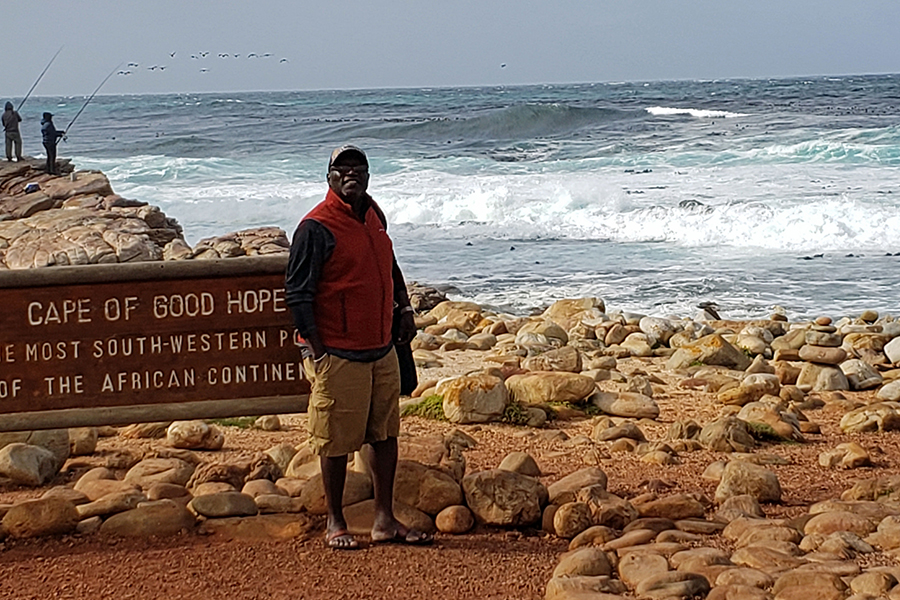Faculty Profile: Ola Olapade
When your research and teaching focus on microbes, you can work anywhere—and Biology’s Dr. Ola Olapade has covered a lot of ground.

Ola Olapade’s Fall 2019 sabbatical included a visit to South Africa, where the confluence of the Indian and Atlantic oceans creates a unique marine environment for microbes. The professor of biology has been a member of the Albion College faculty for nearly 15 years.
Olapade’s research has taken him to the confluence of the Indian and Atlantic oceans in South Africa, Mayan ruins in Mexico and Belize (where he studied the impacts and contributions of microbes to the degradation and deterioration of stone monuments), Morocco, the Great Lakes and more.
Joining the Albion College faculty in 2006 to work with both environmental studies and pre-medical program students, Olapade has directed numerous student research projects looking at soil- and water-based microbial communities, oil pollution and food spoilages. “With students there is so much to work with locally,” he says. The student research sites have ranged as far as the Kalamazoo River, but many are based right on campus, some just a few steps outside the Science Complex doors.
Notoriously prolific even among a faculty of researchers and scholars, Olapade keeps a stack of folders on his desk, each one containing notes on a potential new project. As soon as any of his current work reaches a certain stage of completion, the next project is literally at hand.
“I’m always looking for an interesting challenge, even though I’m really a couch potato,” he says, explaining that his folder system is just one piece of the discipline he began absorbing in childhood. The son of a Nigerian art education/graphic arts professor, Olapade grew up watching his father write papers. Olapade’s Kent State University doctoral adviser further instilled the habit by requiring her doctoral fellows to give formal presentations once a week. “I liked to watch football on Sunday, but I was always thinking about the presentation on Monday that I have to give on my current data collection in lab,” Olapade recalls.
Despite the demands of teaching, advising, directing student research and keeping up with three teenagers, Olapade carves out several hours each week to write his own articles and presentations. Sunday evenings still often provoke feelings he should be “doing something,” and he often finds himself in his office.
A Certain Harmony
Most of Olapade’s research examines and describes how microbial communities impact their local environments and other organisms—from algae to humans—who share those spaces. He approaches his subjects both as a biologist and an environmental health specialist, recognizing the socioeconomic, geographic and education issues that are part of, yes, a harmonious and respectful coexistence with microbes.
“We can’t live without viruses and bacteria,” Olapade stresses. Ironically, he points out that some “modern” problems in the developed world—asthma, allergies—have risen in part because overuse of antibiotics and disinfectants are linked to weakened human immune systems. Conversely, various human activities including deforestation, hunting, animal husbandry and community expansion projects continue to remove more and more of the natural boundaries that separate humans from wild animals and many dangerous pathogens that now invade our environments, such as the corona (COVID-19) and Ebola viruses.
“We’re dealing with COVID now because of the environment that created it,” he explains. “We create environments for disease and we need to pay attention to the complexities that control it.”
Olapade further outlines the complexity of control. “Environmental health and public health are the same,” he says. “One may or may not be predisposed to diseases just because of the level of one’s level of hygiene practices. But if you don’t have an available clean water source, trash pickup or public education, that makes a big difference when it comes to the incidence of communicable diseases in your society.
“You have to look critically at infrastructure and zoning as important to public health,” he continues. “For example, when you look at public water supply, you also look at what can potentially get into the water source. One is a determinant of the other, with regards to public health safety.”
Olapade credits Albion as a great environment for his and his students’ work. “I belong to the school of thought that ‘If it’s not worth disseminating to a larger audience, it might not be worth exploring.’ I’m always thinking about my audience—who wants to know about this study?—even before I start a project. If I don’t have something driving me, there’s no reason to do anything.
“I decide I want to do something and I know there’s support here at Albion College,” he says. “That doesn’t happen at every school. That drives me as well. I love what I’m doing and this is a good place for me.”
